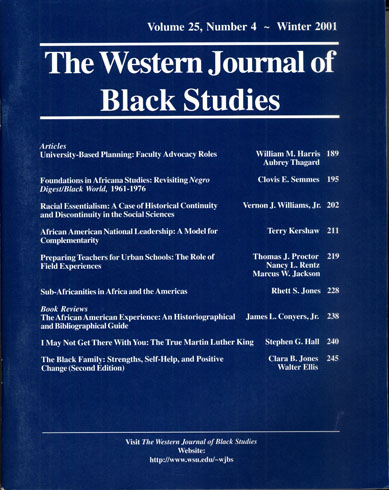Volume 25, Issue 4
University-Based Planning: Faculty Advocacy Roles
William M. Harris and Aubrey Thagard
With an increasing demand by inner-city residents for technical assistance, there are expanded role opportunities for planning faculty involvement. For nearly two decades, advocacy planning activities, especially in the scholarly community, have declined. In that same span of time, racial separation, crimes against individuals and property, poverty among women and children, environmental degradation, homelessness, and apathy in the political processes have all increased. In consideration of these challenges, this essay supports the involvement of university planning faculty in advocacy roles as change agents in urban inner city communities. Several roles for urban advocates are offered.
pp. 189–194
Foundations in Africana Studies:
Revisiting Negro Digest/Black World, 1961–1976
Clovis E. Semmes
Some African-descent scholars, as well as their non-Black counterparts, discourage, distort, or minimize the liberation- and Black solidarity-focused Black Arts and Black Consciousness movement of the 1960s and 1970s as a legitimate and important object of study. Negro Digest, which later changed its name to Black World, was the principal creative, theoretical, and literary vehicle for this movement. As a corrective to the resulting void in Black intellectual discourse, I present a brief review of the role of Negro Digest/Black World in the early development of Afrocentric theorizing. This publication is a rich scholarly resource to resurrect, reconstruct, and build upon critical theoretical concerns related to African-American group issues, African-centered epistemology, Black liberation, and human freedom.
pp. 195–201
Racial Essentialism:
A Case of Historical Continuity and Discontinuity in the Social Sciences
Vernon J. Williams, Jr.
Anthropology, which has for almost a century, been the most progressive social science discipline on the idea of race, has not exhibited the degree of continuity in its interrogation of that idea from the eighteenth to the twentieth centuries in North America that some present-day might scholars presume. Furthermore, despite Boasian anthropology's questioning of the validity of the race concept and the presence of a subaltern tradition of Black ethnology, social scientists still find themselves working within a tradition from which they cannot fully extricate themselves.
pp. 202–210
African American National Leadership: A Model for Complementarity
Terry Kershaw
This paper takes a critical look at the relationship between the nationalist and integrationist leadership traditions. These two traditions have been understood as being in opposition to each other. However when looking at Black social movements, in particular the Civil Rights and Black Power movements, a model of complementarily better explains the means used and the ends desired than a model of opposition. Therefore, a model of complementarily might also serve as a guide to the development of leadership approaches.
pp. 211–218
Preparing Teachers for Urban Schools: The Role of Field Experiences
Thomas J. Proctor,Nancy L. Rentz, and Marcus W. Jackson
This qualitative study explores the perceptions of two different groups of teacher education students following field experiences with culturally and economically diverse learners. Subjects (n=35) responded to 13 open-ended questions which probed their expectations prior to the experience, what they had learned about teaching in an urban school, and what would encourage as well as discourage them regarding teaching in an urban school. Responses for each question were categorized across groups using an inductive process. Results are discussed in light of the mixed findings in the literature on the effects of field experiences with diverse populations. The authors conclude that the many positive perceptions of the subjects in this study seem to be related to the success that the preservice teachers experienced in teaching diverse learners. In addition, the results indicate the need to provide students with opportunities to reflect on their ongoing perceptions of the diversity they are experiencing.
pp. 219–227
Sub-Africanities in Africa and the Americas
Rhett S. Jones
This paper focuses on Sub-Africanities, here defined as the intermediate structures located between surface culture and the deep structure of Africanity. In Africa, Africanity is manifested only in Sub-Africanities, but in many parts of the Americas the cruelties of slavery stripped away Sub-Africanities so that the slaves, in constructing new lives for themselves, were thrown back onto a raw Africanity. Working together they reformulated Africanity and developed new ways of relating it to those Sub-Africanities that survived, as well as to non-African cultural elements. This paper explores some of the resultant patterns.
pp. 228–237
Book Reviews
The African American Experience:
An Historiographical and Bibliographical Guide
Editors: Arvah E. Strickland and Robert E. Weems, Jr.
Reviewed By: James L. Conyers, Jr.
pp. 238–239
I May Not Get There With You: The True Martin Luther King
Author: Michael Eric Dyson
Reviewed By: Stephen G. Hall
pp. 240–244
The Black Family: Strengths, Self-Help, and Positive Change (Second Edition)
Editor: Sadye L. M. Logan
Reviewed By: Clara B. Jones
pp. 245–247

| The WJBS site is normally maintained by Tanya Gonzales. Please feel free to e-mail comments, queries, and suggestions. |
Heading using the h3 tag
Lorem ipsum dolor sit amet, consectetur adipisicing elit, sed do eiusmod tempor incididunt ut labore et dolore magna aliqua. Ut enim ad minim veniam, quis nostrud exercitation ullamco laboris nisi ut aliquip ex ea commodo consequat. Duis aute irure dolor in reprehenderit in voluptate velit esse cillum dolore eu fugiat nulla pariatur. Excepteur sint occaecat cupidatat non proident, sunt in culpa qui officia deserunt mollit anim id est laborum.